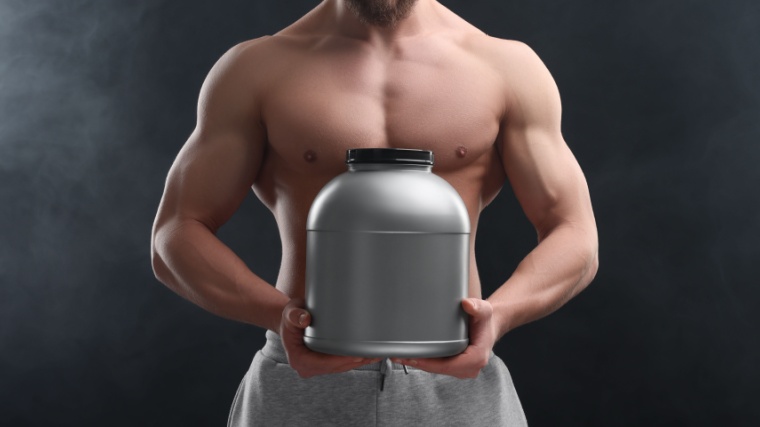Bodybuilding is all about maximalism: How many sets do I need to do to maximize muscle hypertrophy? How do I pick the exercises that optimize my growth potential? Blah, blah blah.
- Too little attention is paid toward finding out how much is enough, especially when it comes to protein.
If you’re into fitness, you’ve probably heard of the age-old protein intake benchmark of one gram per pound of body weight. It’s a neat, tidy figure that you don’t need a nutritional sciences degree to digest.
But the leading research on protein intake paints a different picture. So let’s ask, and then answer, a better question — how little protein can you eat and still build muscle?
How Little Protein Can You Eat To Build Muscle
According to the available research, there is no single-gram benchmark to hit for dietary protein. Studies on this topic often pitch a range:
- “…protein intake was shown to promote additional gains in lean body mass beyond those observed with resistance exercise alone; however, beyond a daily intake of 1.6 g/kg body mass per day (up to as high as 2.2 g/kg/day), the additional effects of protein are greatly diminished.” (1)
We’ll save you the math. Based on this range, your protein intake floor is .72 grams per pound of body weight. So, for example, a 180-pound man should look to consume, at minimum, 130 grams of protein every day, split between whole food sources and supplements like whey protein powder.
- Data from May 2024 shows that plant-based diets are more than capable of fulfilling protein requirements, even for athletes. (2) This paper specifies that protein intake must be, “scaled to meet energy needs.” What exactly does that mean?

[Related: Best Pre-Workout Supplements for Building Muscle]
Protein Intake: Beyond a Benchmark
Here’s the thing. .72 grams per pound may be your protein intake floor, or the rough estimate of how much you need to reap most of the benefits of your bodybuilding workouts, but that isn’t the end of the conversation.
Your dietary habits as a whole affect how much protein you need. For example, those who follow plant-based diets exclusively may find it difficult to consume all their essential amino acids, which aren’t found in adequate amounts in vegetarian or vegan food sources in all cases.
Protein Intake Calculator
You also need more protein if you’re consuming fewer calories. For the bodybuilder, this means doubling down on your protein if you’re cutting or are in a contest prep phase.
- PhD, natural bodybuilding competitor, and BarBend Expert Dr. Eric Helms recommends staying within that 1.6 – 2.2 grams-per-kilogram range while dieting, but erring on the side of more rather than less, especially as you approach or pass single-digit percentage levels of body fat. (3)
- High-protein diets have also been shown to assist with weight loss efforts, since protein is satiating and comes with a strong thermic effect. In essence, you burn calories simply digesting the protein you eat in the first place. (4)
If you’re eating at or above maintenance, don’t stress out trying to shovel down piles of protein. One gram per pound of bodyweight remains a straightforward, practical heuristic — if you fall short, you’re probably not losing gains for it.
References
- Stokes T, Hector AJ, Morton RW, McGlory C, Phillips SM. Recent Perspectives Regarding the Role of Dietary Protein for the Promotion of Muscle Hypertrophy with Resistance Exercise Training. Nutrients. 2018 Feb 7;10(2):180. doi: 10.3390/nu10020180. PMID: 29414855; PMCID: PMC5852756.
- Goldman, D.M.; Warbeck, C.B.; Karlsen, M.C. Protein Requirements for Maximal Muscle Mass and Athletic Performance Are Achieved with Completely Plant-Based Diets Scaled to Meet Energy Needs: A Modeling Study in Professional American Football Players. Nutrients 2024, 16, 1903.
- Roberts BM, Helms ER, Trexler ET, Fitschen PJ. Nutritional Recommendations for Physique Athletes. J Hum Kinet. 2020 Jan 31;71:79-108. doi: 10.2478/hukin-2019-0096. PMID: 32148575; PMCID: PMC7052702.
- Moon J, Koh G. Clinical Evidence and Mechanisms of High-Protein Diet-Induced Weight Loss. J Obes Metab Syndr. 2020 Sep 30;29(3):166-173. doi: 10.7570/jomes20028. PMID: 32699189; PMCID: PMC7539343.
Featured Image: New Africa / Shutterstock